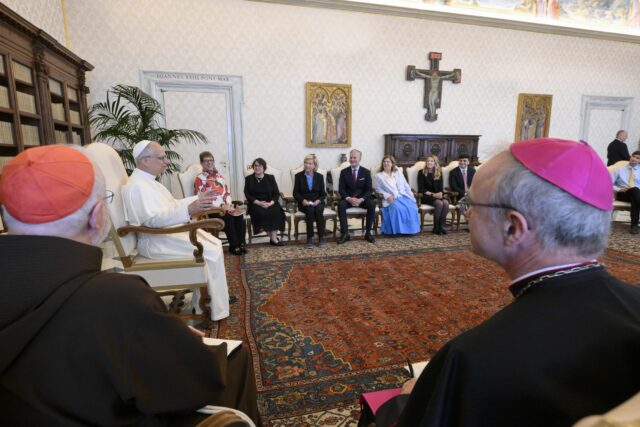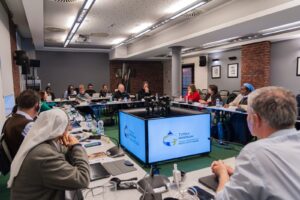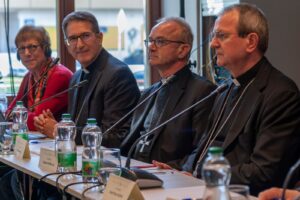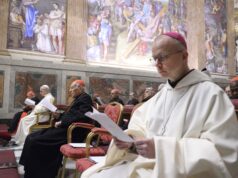
KRAKOW, Poland — As the Pontifical Commission for the Protection Minors concluded its Sept. 29-Oct. 3 assembly in Kraków, “following five days of intensive dialogue, reflection and strategic planning,” it prepares to publish its second annual report Oct. 16.
It’s “much better than the first,” Teresa Kettelkamp, adjunct secretary of the commission and retired Illinois State Police colonel, told OSV News.
“The statistical data is much stronger, which was one of the criticisms of the first annual report, which was a pilot,” said Kettelkamp, who helped build safeguarding procedures in the church in the United States. She headed the then-newly established U.S. Conference of Catholic Bishops’ Secretariat of Child and Youth Protection for six years, from 2005 to 2011.
While the 2024 annual report assessed safeguarding elements in several countries, especially in the Global South, this time it will be focused on survivors.
The 2025 report “will focus on the concept of reparations and introduces key new external data sources,” PCPM said in an Oct. 3 press release.
The report “continues its exploration of Conversional Justice as a roadmap for positive change and healing that stems from the theological imperative of conversion rooted in the concepts of truth, justice, reparations, and institutional reform,” PCPM said.
In the future the commission wants to use the report “as a vehicle of not only sharing the good news, but the areas in which accountability needs to be strengthened,” the commission’s adjunct secretary told OSV News.
Kettelkamp, who worked with the commission for almost 10 years, was appointed adjunct secretary by Pope Francis in 2024 and is overseeing PCPM’s key project of establishing the Universal Guidelines Framework, which she said is set to be finalized, after years of work, in the following months.
Before leaving Kraków, the commission succeeded in establishing “the final draft,” and after the final remarks by members, the guidelines will go for a round of consultations in different dicasteries and the commission will “hopefully get it to the Holy Father for his blessing,” to be finalized and published in the first quarter of 2026, Kettelkamp told OSV News.
Universal guidelines, Kettelkamp said, are divided into “principles, criteria and indicators.”
“We are recommending that the principles are mandatory. And the first principle is church leadership,” she said.
Through that principle the commission aims to establish mechanisms for “church authority to take responsibility to ensure the children and the vulnerable under the care of the church are safe and the church is a safe place,” Kettelkamp told OSV News.
“We have the words of Jesus Christ that say: it’s your job to take care of little children,” she said, explaining that it’s the local bishops’ task to set up safeguarding measures and the commission is the advisory body in that regard.
“There’s no question” as to where the church puts responsibility for safeguarding, she said. Hierarchy is expected “to be leaders in this area,” and guidelines are set to help with accountability.
“The biggest challenge now is getting our guidelines blessed and implemented so we can start working at the local level and instilling that culture of safety,” Kettelkamp told OSV News. “It’s almost our biggest success, but our biggest challenge.”
The plenary meeting in Kraków was the first under the new president of the commission, Archbishop Thibault Verny of Chambéry, France, who “called for a renewed commitment to safeguarding as a core expression of the Church’s identity and mission,” the Oct. 3 statement said.
While “fostering a universal safeguarding culture” is his primary goal, through the Universal Guidelines Framework and the annual reporting, he also wants to strengthen regional networks and engage in dialogue with civil institutions, PCPM said Oct. 3, highlighting “listening to victims/survivors, promoting transparency, and building systems of accountability” as key means.
Kettelkamp emphasized that Archbishop Verny “was a former member” of the commission, “so he’s not coming in cold as an archbishop from another country who doesn’t know what the commission does. He knows what we do. He knows what we’ve done. He knows the history,” she told OSV News, describing the new French leader as a man of action known in France as a “very strong advocate of safeguarding.”
She said since the start of his tenure at the commission he has been “engaged,” “hands on” and “very involved.”
The commission listened to survivors during the Polish plenary.
“You will see a better awareness if the bishops sat down with survivors and heard their stories. The Holy Spirit then steps in and changes hearts,” Kettelkamp told OSV News.
“It’s not just us, but there’s heavenly help here. And I just think that if we can encourage the bishops to be more sensitive to the value of children — as they should be as apostles of Christ — we can see a global conversion in the safety of children and hopefully entities outside the Catholic Church. Other religious communities can also follow our lead.”
Asked whether Poland was picked amid particular challenges for safeguarding in the country, she said it was more “the result of years of learning that we need to be where the people are.”
Kettelkamp told OSV News that the job of the commission is to “be advisers to the Holy Father, not investigators, but to see what’s happening. And you see what’s happening by being where the people are and hearing them and their issues.”
In the five years since the crisis came to light in the country, the church in Poland has taken up many reforms, including initiating the St. Joseph Foundation in 2019, which finances therapy and other needs of abuse survivors, and setting up the Office of Delegate of Child Protection of the Polish bishops’ conference led by Archbishop Wojciech Polak of Gniezno.
It has not, however, issued a national report on the scope of abuse, which the investigating commission that the conference announced would be established — is expected to work on. The commission’s idea however was announced as early as in March 2023, only to still not be established 30 months on.
Experts point to the reluctant answer to the abuse crisis as the reason why the level of trust in the Catholic Church in Poland has hit a record low with only one third of traditionally Catholic Poles trusting the church.
“I would not identify this country as any different from other countries who have challenges with accountability, with supervision, with welcoming victims and survivors. It’s a learning curve, and it’s a culture,” Kettelkamp told OSV News.
She said in a lot of places “a lot of bishops — and I found this in the U.S. — are very hesitant to talk to victims and survivors because they don’t know what to do.”
She said, “Even if you’re not litigious like we are in the U.S., they don’t know how to handle it or they don’t want to handle it, or for whatever personal or clerical reason they would prefer to work on other issues confronting them. It’s a tough, tough human issue, and unless you work with victims and survivors and hear their story, you really can’t have a conversion of heart.”
She said it’s “important to listen to victims and survivors hear what they have to say. They sometimes don’t want anything. They just want you to listen.”

The Polish bishops conference said in a statement following the Oct. 3 meeting with PCPM that they were able “to share their initial comments on the application of the new measures” of safeguarding “in the context of the Polish legal system and cultural traditions.”
“There was also discussion on how the new guidelines could help church institutions in Poland to be even more effective in protecting minors,” the statement said.
PCPM was the first entire curial office the newly elected pope met early in the pontificate, on June 5 — less than a month into his election. U.S. Cardinal Sean P. O’Malley, then president of the commission, was the first prelate to meet the pope during his first individual audience after the May 8 election.
Asked about cooperation with Pope Leo XIV, Kettelkamp said “he was supportive of meeting with all of us that early in his pontificate” and that he has a “high level of expectation from us to keep children safe.”
“If he didn’t think the pontifical commission was important or not as important as other issues that were flying at him, he probably would not have been able to make time for us.”

Kettelkamp recalled how she first met Cardinal Robert Prevost — a fellow Chicagoan — when he was leading the Dicastery for Bishops and how she was personally “thrilled to meet somebody seriously who spoke English” in the curia.
During the June 5 meeting with the pope, she emphasized, she witnessed the pope’s listening approach and saw his sense of humor and his human face.
Irma Patricia Espinoza, responsible for the “Memorare Initiative” of the commission, spoke in Spanish, presenting the project that aims to assist and collaborate with local churches worldwide in training and strengthening prevention.
Kettelkamp recalled, “I told the Holy Father she’ll be speaking in Spanish, so I will not understand a word. And he said, well, you could come and sit next to me and I’ll translate for you.”








